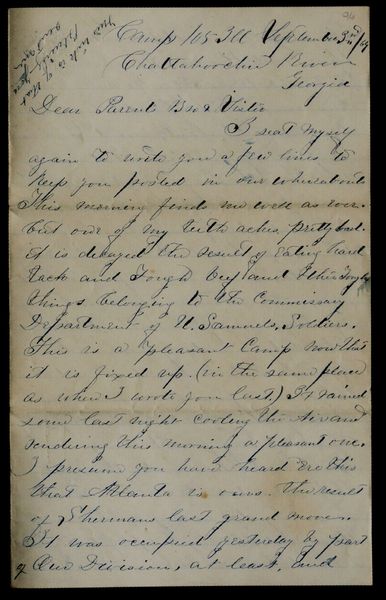Wheeler, Lysander, 1837-1917 to his parents, brother-in-law and sister
Order a pdf of this item here.
A high-resolution version of this object is available for registered users. LOG IN
Gilder Lehrman Collection #: GLC07460.096 Author/Creator: Wheeler, Lysander, 1837-1917 Place Written: Georgia Type: Autograph letter signed Date: 3 September 1864 Pagination: 4 p. : envelope Height: 20.1 cm, Width: 25.2 cm Order a Copy
Written near the Chattahoochee River in Georgia. Writes that one of his teeth has decayed because of the hard tack and tough beef he has been eating. Part of Atlanta, Georgia has been occupied by the Union Army thanks to General William T. Sherman's "last grand move." Sherman's main army is still 25 to 30 miles away and that Confederate General John Bell Hood's army is divided in the center. At night he heard noises that sounded like cannonading of Atlanta but it turned out to be the rebels destroying their own magazines and military stores. Writes that during the siege Atlanta was surrounded by forts and the Union could clearly see the Confederates improving their defenses. States that the rebels held Atlanta as long as they could because it is the "Richmond of the west." Harrison is in charge of the supplies for General Henry Warner Slocum. He writes that General Slocum is different then General Joseph Hooker in that General Slocum makes the troops preform more garrison duty. Does not think General Slocum will make a good "action" general but the troops are grateful for the little rest they can get. They are busy unloading cars of supplies. Some of the troops bound for Chattanooga, Tennessee have brought cattle down to Atlanta. Writes that the road between Chattanooga and Atlanta has been attacked by rebel guerillas and this has affected the mail service.
Citation Guidelines for Online Resources
The copyright law of the United States (title 17, United States Code) governs the making of photocopies or other reproductions of copyrighted material. Under certain conditions specified in the law, libraries and archives are authorized to furnish a photocopy or other reproduction. One of these specific conditions is that the photocopy or reproduction is not to be “used for any purpose other than private study, scholarship, or research.” If a user makes a request for, or later uses, a photocopy or reproduction for purposes in excess of “fair use,” that user may be liable for copyright infringement. This institution reserves the right to refuse to accept a copying order if, in its judgment, fulfillment of the order would involve violation of copyright law.
